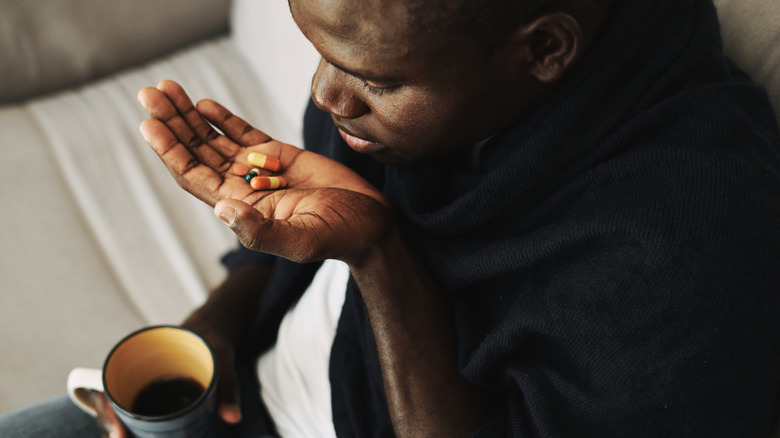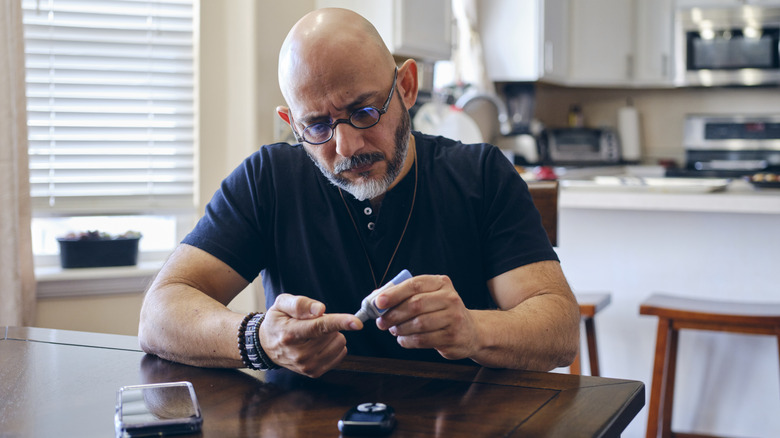When Coffee And Diabetes Medication Are Taken Together, This Is What Happens To Your Blood Sugar
According to Drive Research, nearly 3 out of every 4 people in the U.S. consume coffee at least once a day. Additionally, 93% of survey respondents said they drank the steamy beverage at least weekly. With statistics like these, chances are good that you are a coffee drinker. And, if you are, it's a good idea to know whether coffee could have negative interactions with any medications that you're taking.
One type of medication that may potentially interact with your morning cup of joe is diabetes medications. Healthcare Communications Network explains that drinking coffee may make drugs such as glimepiride (Amaryl), glyburide (DiaBeta, Glynase PresTab, Micronase), insulin, pioglitazone (Actos), and rosiglitazone (Avandia) less effective in controlling your blood sugar. The reasons come down to two things: what you're likely adding to your coffee — such as a hefty dose of sugar and/or creamer — and the effects of caffeine.
What you're adding to your coffee can raise your blood sugar
Adding milk or sugar to your coffee can impact how well your diabetes medication works because they can spike your blood sugar. This can be especially true if you like to indulge in specialty coffee drinks from your favorite coffee shop. For example, a grande caramel Frappuccino from Starbucks packs a jaw-dropping 60 grams of sugar (about 15 teaspoons) into a 16-ounce serving (per Inspira Health).
A better option? Toby Smithson, RDN, CDCES, told diaTribe Learn that her top recommendation is to order your coffee black with no milk or sweetener added. (Here are some more tips for how to order a healthier Starbucks drink.) However, you don't have to forgo creamer altogether. Low-sugar, low-carb options made with almond milk, coconut cream, or sugar substitutes are fine. You can also use half-and-half or heavy cream in moderation.
Acceptable sugar substitutes, according to Medical News Today, are sweeteners such as stevia, monk fruit, tagatose, sucralose, aspartame, acesulfame potassium, saccharin, neotame, allulose, and agave nectar.
Caffeine in coffee can affect your blood sugar, too
The caffeine in coffee can interfere with diabetes medications by affecting how the body processes insulin and regulates blood sugar. For people with type 2 diabetes, caffeine may reduce insulin sensitivity — meaning the body's cells don't respond as well to insulin, causing blood sugar levels to rise more after meals. This effect can make it harder for diabetes medications to do their job, since they're designed to help lower blood sugar or improve insulin action. Caffeine may also increase levels of stress hormones like epinephrine, which further limits glucose uptake by cells and suppresses insulin production. (Rather ironically, if you don't have diabetes, some research shows that higher blood levels of caffeine might help prevent type 2 diabetes.)
How much coffee can you have without affecting your blood sugar? The Mayo Clinic says that all it takes to impact your blood sugar levels is about 200 milligrams of caffeine, which is roughly the amount in one to two cups. Factors like age, weight, and whether you regularly consume coffee may also play a role. For example, some studies indicate people may develop a tolerance over time, so caffeine has less impact on their blood sugar. Research on this is mixed, however, with other studies showing that blood sugar spikes still occur, even with daily consumption. That said, it can be safe for those with diabetes to drink coffee, provided they keep the sugar content low, limit caffeine, and keep an eye on their blood sugar.


